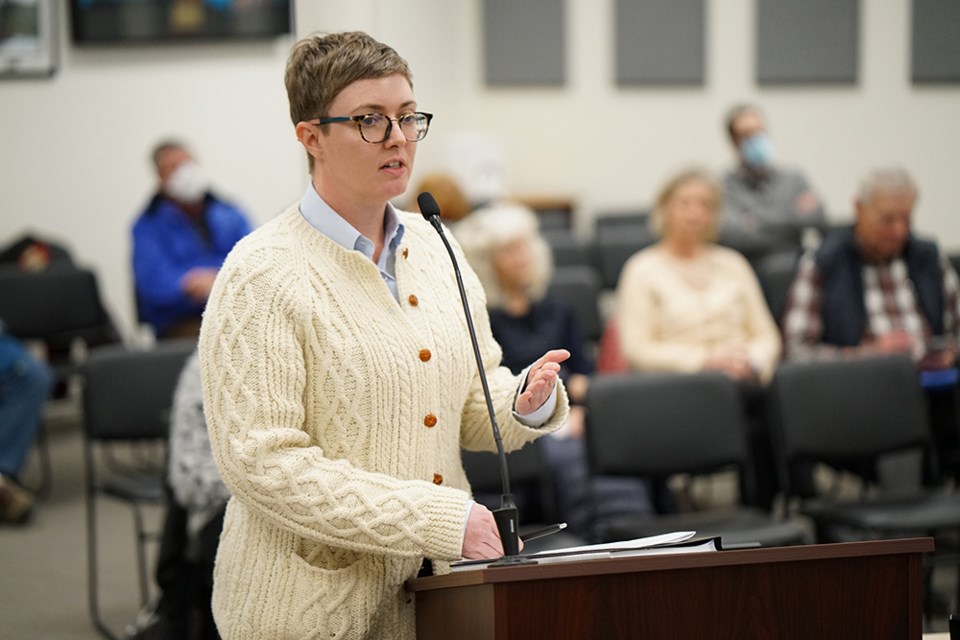Powell River councillors will look at policy around tiny homes and recreational vehicles at the planned strategic planning session for the city in February.
At the January 31 committee of the whole meeting, manager of planning services Daniella Fergusson said in December, council members had questions about how tiny home policy would or could be applied in the city. She said a policy summary had been compiled to explain that.
Fergusson said BC Housing defines a tiny house as a permanent, ground-oriented dwelling that is detached, movable and non-motorized, under 500 square feet and tailored to compact design.
“It is neither a mobile home nor a recreational vehicle; it’s intended for full-time living,” said Fergusson. “Lots of tiny homes might be 100 square feet or 250 square feet and there’s a lot of variety.”
Fergusson said the city is guided by provincial regulations, policies and enactments. She said BC Housing has a helpful report about tiny homes. If the structure is on wheels, it is not going to be considered a dwelling and is not permitted in the city because the BC Building Code does not permit it as a dwelling.
“If it’s on wheels, it’s something that is intended to be used recreationally,” said Fergusson. “It is not considered by the BC Building Code to be a safe place for someone to live year-round.”
Fergusson said in Powell River, the zoning bylaw has a minimum size for a single-family home, which is 600 square feet. She said for a carriage house, there is no minimum size, as long as it meets BC Building Code standards.
Fergusson said there are risks connected to the city knowingly permitting buildings that are not compliant with the code. This can include negligence and fines, she added.
As for recreational vehicles, they are only allowed in campgrounds, according to Fergusson.
She said if council wants staff to look at tiny homes further, staff could be directed to look at creating a new zone for smaller fee-simple or stratified homes.
Code compliance
Fergusson cautioned council against directing staff to make any policies that would be in contravention of the BC Building Code.
Councillor Trina Isakson said the province does not permit recreational vehicles or trailers to be used as permanent housing but people do because there is a housing crisis. She said she doesn’t think it’s ethical to fine people who cannot afford or find suitable housing. She asked if there is any movement at the provincial level for creating safety standards where the city can envision a future where these accommodations can exist under the BC Building Code.
Fergusson said she was not aware, but perhaps the city’s building officials would have some knowledge.
Councillor George Doubt said he liked the suggested direction, where there could be a subdivision or strata-owned property where people could place a small home on a foundation.
“It might be interesting for a developer to find a piece of property that it would work with and set up a tiny home development,” added Doubt.
Councillor Rob Southcott said he is aware that Port Alberni, Duncan and a municipality down in the Capital Regional District have created developments of tiny dwelling units for homeless people. He asked if that was the type of development that could be created for a new zone in the city.
Fergusson said staff had looked into the Port Alberni example and it was enacted under a temporary-use permit for temporary housing. She said building permits were required and an architect was needed to ensure building code compliance. She said City of Powell River staff will be watching to see if the temporary housing stays, knowing that transitional and supportive housing is on the way.
“Our staff’s intent for creating a new zone for small houses would not be at that level,” said Fergusson. “The intent would not be for emergency shelter. It would be for permanent housing that’s more affordable.”
Mayor Ron Woznow asked if a developer was interested in putting together a tiny home development, how long it would take for a zoning request to be processed.
Fergusson said it is difficult to say. Rezonings are taking about six months, and that’s when an application is close to complete, she added.
Isakson made a motion to refer the matter to the city’s strategic planning process this month, which was carried unanimously.



